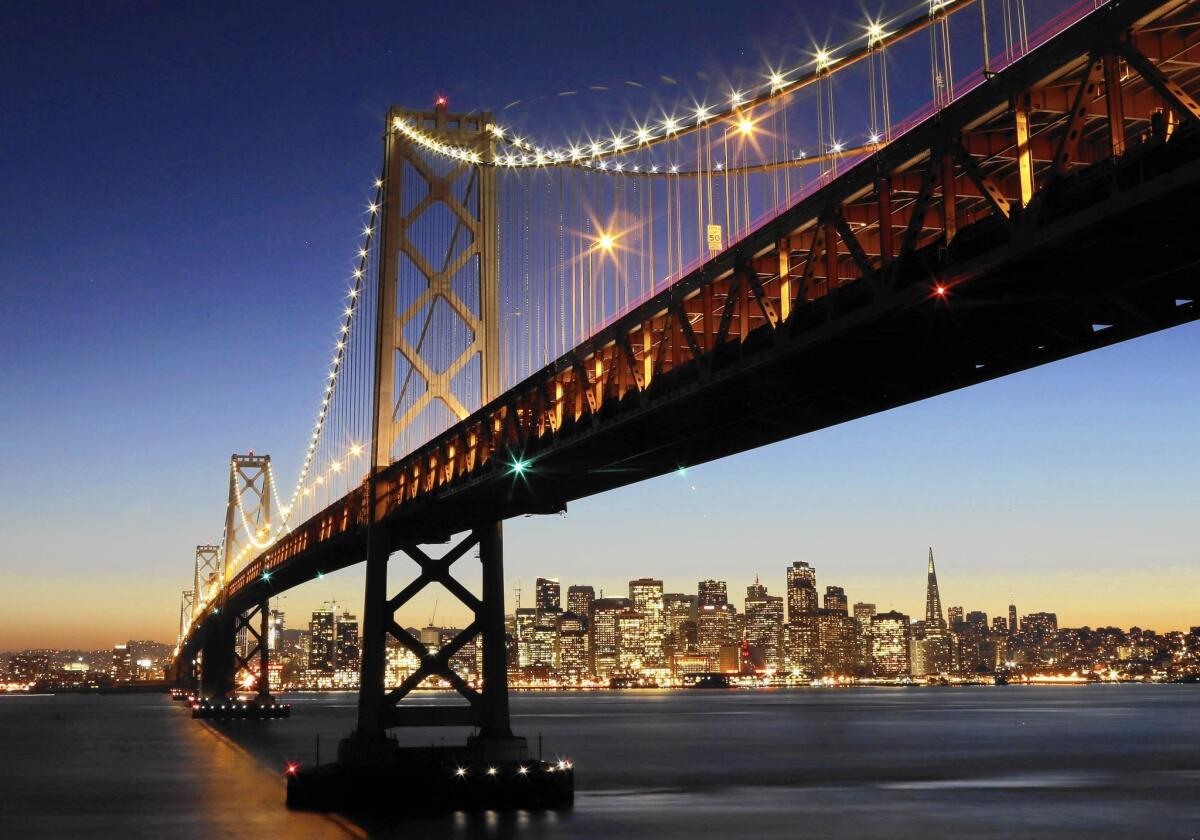In San Francisco’s close quarters, political giants are bred

- Share via
Reporting From San Francisco — This is a city of 47 square miles, 800,000 people and millions of deeply held, fiercely fought convictions.
Spilling down its hillsides to the westernmost edge of the country, San Francisco is the closest thing to an East Coast enclave set along the Pacific, a place, like New York or Boston, where politics is a passion, a sport, something everyday people fuss and fight and scheme over.
As blue (politically) as San Francisco Bay, the city has 27 officially chartered Democratic Party chapters, among them the Raoul Wallenberg Jewish Democratic Club, the Filipino American Democratic Club, the Black Young Democrats of San Francisco and the Harvey Milk LGBT Democratic Club. That works out to roughly one party franchise every few blocks.
There are countless more neighborhood councils, civic associations, interest groups — branches of the Sierra Club, the NAACP and the like — all clamoring for their particular agendas.
“It’s a city where people have always been able to be loud and proud about who they are, not just as individuals but as a group or a community,” said Ace Smith, a Democratic strategist who has decades of experience running San Francisco campaigns.
The result is a kind of hyper-democracy and political forge that has fashioned some of California’s most powerful and enduring elected leaders, in numbers far out of proportion to the city’s relative pint size.
The ranks include the late Gov. Pat Brown; former Assembly Speakers Willie Brown and Leo McCarthy; Rep. Phillip Burton, one of the most prolific and consequential U.S. lawmakers of the latter 20th century; House Democratic leader (and former Speaker) Nancy Pelosi, and California’s two United States senators, Dianne Feinstein — a former San Francisco mayor—and Barbara Boxer, who worked just across the Golden Gate Bridge as a congressional aide to Burton’s younger brother, John, current head of the state Democratic Party.
The pattern may persist. Though it is exceedingly early, the front-runners to succeed Boxer when she retires after 2016 and to replace Gov. Jerry Brown when his term ends in January 2019 — Atty. Gen Kamala Harris and Lt. Gov. Gavin Newsom, respectively — are each products of San Francisco’s political mill. Newsom is a former mayor and Harris was twice elected the city’s district attorney; both were proteges of Willie Brown.
(Jerry Brown, a San Francisco native and longtime Oakland resident, began his political career on the community college board in Los Angeles before making the leap to Sacramento.)
There is nothing mysterious about San Francisco’s export of high-profile politicians, nothing like the alchemy of air and water that produces the distinctive tang of its signature sourdough bread.
Simply put, it’s fierce competition, at virtually every level, starting with the leadership of its political clubs and spreading to the lowliest contests for elected office on up to races for the Legislature and Congress.
Where San Diego and Los Angeles lie back, most of their residents scarcely interested in politics, San Francisco leans in: chin out, elbows wide and sharp.
“There is a culture here of fighting over just about everything in the public space,” said Eric Jaye, another of the city’s veteran political strategists, from global issues like the Middle East to protecting the neighborhood coffee shop from an onslaught of franchised beans.
Close quarters make the fighting especially fierce — in a city this hemmed in, it’s practically impossible to turn around without bumping into someone’s ego or stumbling across a pet cause. It can be enervating, and at times absurd.
But it makes for a stern test.
As in sports, the best politicians improve with practice. Those who consistently play on a higher level, not just surviving but thriving, naturally acquire greater skill.
“If you come up through the labyrinth of clubs, starting at the bottom, you get a fundamental grounding in politics like nowhere else,” said Art Agnos, who arrived on the scene as a neighborhood activist in the late 1960s and rose steadily through the Democratic ranks to become a state assemblyman and, 20 years later, the city’s mayor.
It may not be as romantic as leaving your heart in San Francisco. But it does offer a leg up getting to Sacramento or Washington.
Twitter: @markzbarabak
More to Read
Sign up for Essential California
The most important California stories and recommendations in your inbox every morning.
You may occasionally receive promotional content from the Los Angeles Times.










